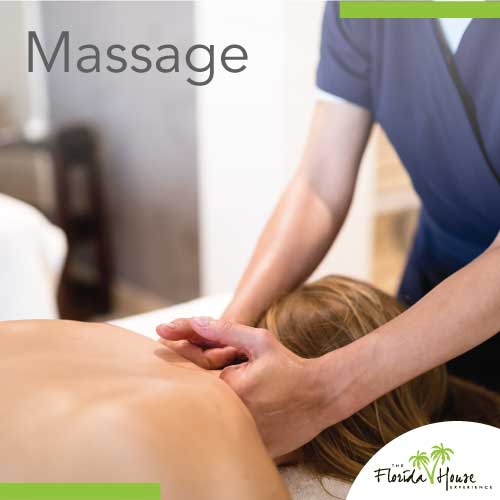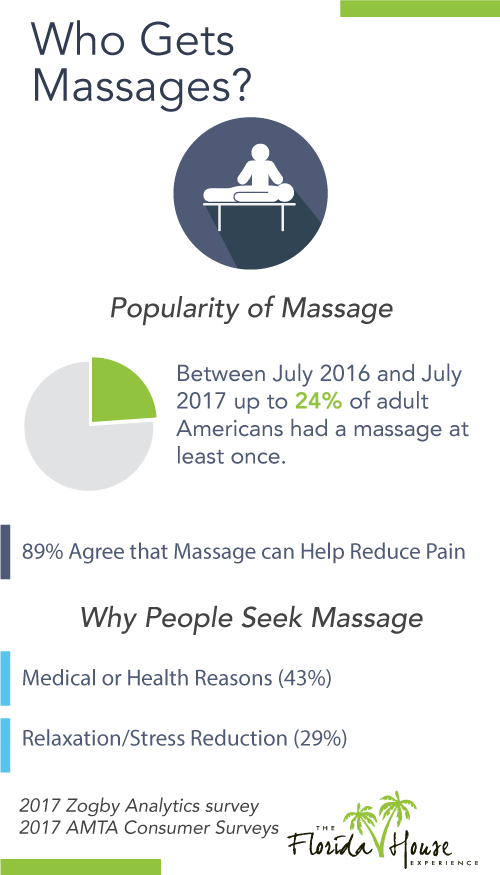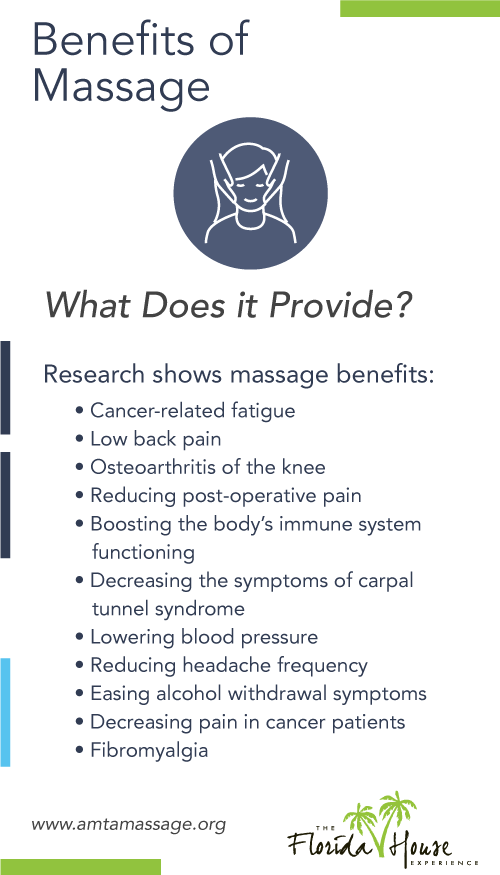At FHE Health, we believe in treating the whole body. This includes aiding in treating addiction and mental health disorders but also in improving the physical health of your body. Medical massage therapy is a component of this care for many of our patients.
Keep in mind this is just one of the numerous services we offer as a component of your care here. Your doctor, therapists and case managers may recommend massage therapy. When they do, it will be one part of your recovery at our high-quality, state-of-the-art facility.
What Is Massage Therapy?
 Massage therapy is a form of holistic care that provides support to the body’s tissues and muscles. It is a manual manipulation of the body, which means a practitioner applies force and movement to specific tissues of the body, including ligaments, tendons, connective tissues and muscles. The goal is to help encourage well-being and healing.
Massage therapy is a form of holistic care that provides support to the body’s tissues and muscles. It is a manual manipulation of the body, which means a practitioner applies force and movement to specific tissues of the body, including ligaments, tendons, connective tissues and muscles. The goal is to help encourage well-being and healing.
There are many types and methods of massage therapy, each with its own goal to help treat or improve specific areas of concern. Two main variants are presently in use at FHE Health.
Rehabilitative Massage Therapy
In this form, the goal is to help improve the health of the tissues while also encouraging proper movement and function. This is the type of massage therapy you may hear called deep tissue massage or therapeutic massage. We aim to stimulate the tissues to heal, grow and improve, therefore reducing pain, improving mobility and providing a stronger, healthier body.
Relaxation Massage Therapy
Many people view relaxation massages as a frivolous investment, but they have a significant purpose, especially in the context of drug and alcohol treatment or mental health care. A stress relief massage like this works to stimulate blood flow to the tissues and to relieve tense muscles in the process. By reducing this tension, it’s possible to physically feel more at ease. A Swedish massage is an example of this type of relaxation massage.
How Is Massage Therapy Valuable to You During Addiction or Mental Health Treatment?
 During drug addiction treatment or mental health care, your body is under intense pressure. Detox, for example, stresses the body, causing physical pain as you go through withdrawal from the drug of choice. During this time, your muscles are very tense, and relaxation seems impossible. Massage therapy during detox can help to ease some of this physical pain without introducing other drugs. As a holistic approach, it’s safe to use during most detox regimens.
During drug addiction treatment or mental health care, your body is under intense pressure. Detox, for example, stresses the body, causing physical pain as you go through withdrawal from the drug of choice. During this time, your muscles are very tense, and relaxation seems impossible. Massage therapy during detox can help to ease some of this physical pain without introducing other drugs. As a holistic approach, it’s safe to use during most detox regimens.
This care extends further than this, though. For example, for those battling mental health complications, massage can help to put not just your muscles at ease but also your mind. Massage for depression can work to stimulate blood flow throughout the body, helping to fuel cells and calm the central nervous system. This can ultimately provide you with more of an ability to focus on your treatment and recovery.
What Does Massage Therapy Do for the Body?
Medical massage therapy is a powerful tool. Though it seems simplistic, it can also help provide a variety of benefits to you throughout your treatment and beyond. Take a look at some of the health benefits of massage you may experience.
Stress Relief Massage
One of the ways massage therapy helps during rehabilitation is by releasing hormones that stimulate happiness and relaxation. According to the American Massage Therapy Association, the process of massage works to increase the body’s natural production of serotonin and dopamine.
It also reduces cortisol in the bloodstream, which is known as the stress hormone. This happens because of the pressure points stimulated. This works to trigger the brain’s vagus nerve, causing it to slow the heart rate and drop blood pressure. All of these factors in an environment that is both soothing and free from distractions create a stress relieving environment.
Improving Sleep Quality
During any type of treatment, sleep quality is always limited. With the help of massage for health and relaxation, it’s possible to reduce some of the pain that interferes with quality sleep. The process of massage helps to reduce anxiety, allowing individuals in therapy to sleep better. Restful sleep improves the quality of life by profound levels in some patients who may be struggling due to detoxification.
Stimulating Healing
Many people with an injury to a muscle group benefit from massage therapy. The action of putting pressure on the tissue stimulates the body to increase blood flow to the area. As a result, oxygen-rich blood moves into the damaged tissues, encouraging healing. It also works to improve the effectiveness of the body’s lymph system in reducing pain symptoms. This system is also critical in the flushing of toxins from the body, a common need after drug use.
What Symptoms Can Massage Therapy Alleviate?
 The health benefits of massage differ for each person and each situation. When you meet with your team at the Florida Experience House, we’ll work with you to create a cohesive plan addressing how massage can help you. At the same time, we learn what symptoms you’re struggling with right now, and we may recommend massage therapy if it can help minimize those symptoms.
The health benefits of massage differ for each person and each situation. When you meet with your team at the Florida Experience House, we’ll work with you to create a cohesive plan addressing how massage can help you. At the same time, we learn what symptoms you’re struggling with right now, and we may recommend massage therapy if it can help minimize those symptoms.
Some symptoms massage therapy can minimize in those who have mental health or substance abuse disorders include:
- Physical pain
- Depression and anxiety
- Muscle aches, much like flu symptoms
- Tension and stress-related pain
- Insomnia
- General fatigue
- Mental clarity and focus
- Physical injuries or chronic pain
Perhaps most important, when we use holistic massage in this way, we can lower the risk of abandoning treatment because of pain experienced during withdrawal. By alleviating this pain and improving your quality of life, you may be better able to continue rehabilitation and less likely to stop getting the help you need.
Stress and Anxiety’s Large Role in Rehabilitation
Change is a drastic component of rehabilitation. Your body is shocked. Your mind is moving quickly through a variety of complex thoughts. You feel sad, angry, and frustrated one minute and hopeful the next. During your treatment, you’ll have opportunities to bring up these emotions so you can learn to properly manage them. Stress and anxiety play an important role in rehabilitation and need to be a component of that healing process, but they don’t have to limit you.
Stress is a big factor in recovery. You may worry about whether or not you can make it through treatment, or you may feel overwhelmed by a sense of dread about what life will be like after you get to a stable point. You may worry about failure, making amends and starting fresh. This stress needs to be alleviated or you may find it hard to work through those thought patterns and end up struggling to remain in recovery.
Anxiety can be debilitating for those in any type of rehabilitation. Individuals who have severe anxiety or develop anxiety during treatment may feel a sense of panic that can cause reflexive emotions and actions. If you don’t know what to do, you may react in a way that helps you to feel safe. This may include leaving rehab to get to what makes you feel normal.
Massage therapy for depression, anxiety and stress relief helps you to remain focused on your healing and recovery. It allows you to push aside symptoms and focus on what is happening now to move past the limitations you feel in this moment.
Part of Our Holistic Approach to Treatment
At FHE Health, we try to provide each patient with a wide range of options to treat their needs, including the most advanced care for substance and mental health disorders. Yet, healing the mind and body requires a holistic approach as well, so our massage therapy services are a component of this care. We only provide it to patients who can benefit from this type of one-on-one care.
Feel free to ask our team about massage therapy at FHE Health. Learn how it can be one part of a personalized plan to address your health needs in a safe, comfortable environment.








